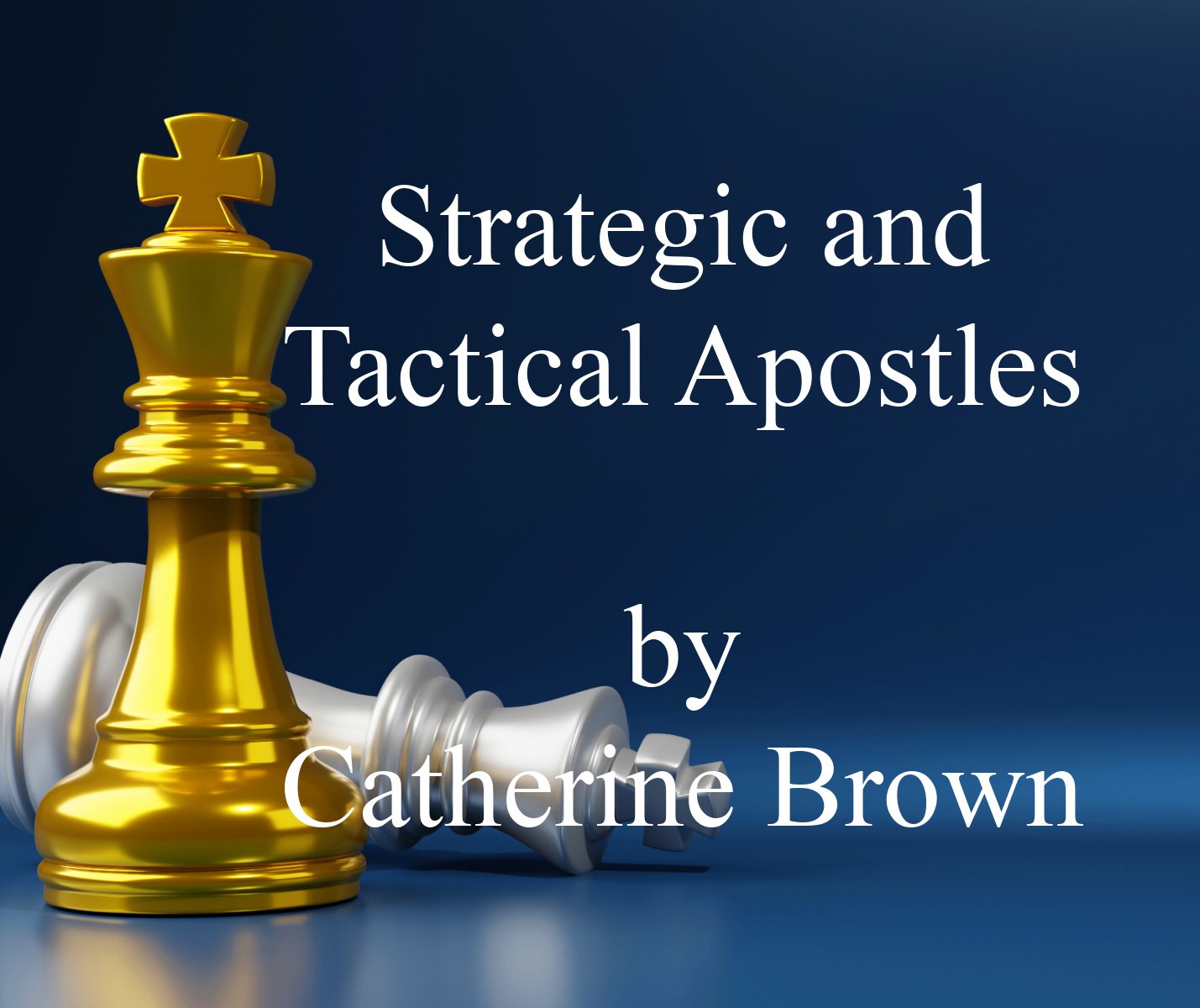Strategic and Tactical Apostles by Catherine Brown
/In my ministration and travels in various nations I have noted that there is potentially a lack of understanding concerning apostles who are strategists and those who are tactical apostles. Whilst these are not divergent qualities, yet they are distinct from each other.
Strategic apostles will deploy tactical apostles and others in implementation of Kingdom vision and assignments.
Tactical apostles will be deployed at ground level to execute vision strategy. Strategic apostles are mobilisers and visionaries, with capabilities to consolidate and implement vision working with tactical apostles.
A tactical apostle can be described as your eyes and ears and hands and feet on the ground.
A strategic apostle is a Moses-type, a father and a military commander giving direction and instruction. Within this particular mode of operation, “father” is not limited to male only but to women who are also functioning as apostles.
When the Israelites asked for water Moses responded in a pastoral capacity. Importantly, Moses then shifted into the mind set and mantle of an apostolic general in order to lead the people in battle against the Amalekites. In so doing he was both a father inspiring faith and a general in battle. The apostolic kingdom mind set must take precedence in warfare over the pastoral.
“The Amalekites came and attacked the Israelites at Rephadim. “Moses said to Joshua, “Choose some of our men and go out to fight the Amalekites. Tomorrow I will stand on top of the hill with the staff of God in my hands.” Exodus 17:8-9
Moses made strategic preparations for battle. He had a plan and he implemented it. He set a time line: “tomorrow”; He created a defensive strategy and logistics to confront the incoming enemy army: “choose some men and go out to fight”; He set a mission objective i.e. a target: “the Amalekites”; He developed an offensive strategy: “I will stand on top of the hill with the staff of God in my hands.”
Moses took his position as God’s leader and took his place in the midst of serious warfare. He appointed leaders; he engaged the generations; he delegated task to a capable member of his team – Joshua - and he assigned responsibility of raising other capable team members with Joshua involved in choosing them.
Moses had a strategy, which became the infrastructure for success and victory. He took tactical steps to outwork logistics. He identified and employed good use of people resource. He was organised and established a chain of command and clear communication. He established a command centre/HQ by forming a prayer altar and strategic vantage point on the high place of the hill overlooking the battleground.
His team were informed, equipped and resourced. Moses had authority with God and before men and used it wisely. He possessed military might, intelligence and strategic insight with which he stewarded and implemented his apostolic wisdom and authority. He led in a visible, supported and united way with Aaron and Hur being his personal armour bearers. Moses had a divine perspective of the battle both from his physical vantage point and from his spiritual position as God’s leader.
During intense times of warfare apostolic strategic leaders must lead from the front. Moses maintained his stewardship role and duty of apostolic oversight, both for Joshua and for the entire people whom he served by having a visible presence during the battle, operating in governmental grace and authority, making decisions quickly and incisively, and leading with courage and integrity.
Importantly we see how Joshua obeyed Moses’ instruction. Joshua was the tactical expression of Moses’ strategic plan: “So Joshua fought the Amalekites as Moses had ordered, and Moses, Aaron and Hur went to the top of the hill.” Verse 10
A tactical apostle runs with that strategic direction and instruction in order to fulfill the vision.
All strategic apostles have some tactical strengths but not every tactical apostle is a strategist. Tactical apostles are task focused, whilst strategic apostles are focused on the big picture deploying people for task and Kingdom assignments. Tactical apostles need to connect to strategic apostles for the big picture.
Strategic apostles are needed for alignment and you need tactical apostles to completely fulfil assignment. A strategic apostle is an overseer, commander of an army and a father of a family. They position people in the right places, to do the right thing = alignment.
Strategic apostles create infrastructure then tactical apostles use that infrastructure to fulfil Kingdom assignments. Strategic apostles are clear on purpose, they position people, and they create strategies for tactical implementation. They set up chain of command, equip, align, empower, and deploy.
Jesus is our ultimate example of a strategic Apostle. He created Kingdom paradigms and patterns establishing infrastructure and governance that was strategic and transformational. Apostle Jesus raised a team of apostles by training them personally, praying for them, discipling them, modelling ministry to them, teaching, instructing and commanding them. Christ also fulfilled the strategic role of training others to be His disciples teaching and empowering all concerning the Kingdom message with signs and wonders following.
Jesus was the “set man” over a team of apostles exemplifying the importance of relationship, first amongst equals, plurality, accountability and authority. He raised a team of disciples whom He designated, appointed, authorised and anointed as apostles. He then raised a team of disciples (not all of whom were apostles but functioned in other ministry capacities). The disciples initially had no physical “base” to call a command HQ but Christ was their Commander and the One to whom they returned and reported after various missions. (Luke 10:17-20). We can consider the Council at Jerusalem, which was later established as a prototype of Kingdom HQ for strategic and tactical purposes.
Jesus had a strategy of implementing His Kingdom mission and He used a tactical team to do so. He sent teams out on mission into territories to bring about Kingdom transformation (Luke 10:1) Christ and his team were totally committed to the same Kingdom objectives and shared vision and values. Strategic leaders are concerned about Kingdom advancement and transformation in global territories.
Jesus' ministry was not consensus driven and neither was it a committee who voted. They were apostolically led and prophetically influenced. Jesus delegated authority and together they acted with apostolic authority, wisdom and love. They were appointed because of call, not because of experience, democratic process or education but by the unction of the Holy Spirit and Father's direction. (Luke 6:13) Strategic visionaries know how to employ and deploy others in designated areas of responsibility in order to fulfil Kingdom assignments.
Jesus modelled Kingdom governance, authority, power, love and grace in church and in the world. He demonstrated a lifestyle of prayer and spiritual warfare in public and in private and exemplified and led His disciples into being of “one accord”.
©2018 - 2022 Catherine Brown, Gatekeepers Global Ministries, www.gatekeepers.org.uk





